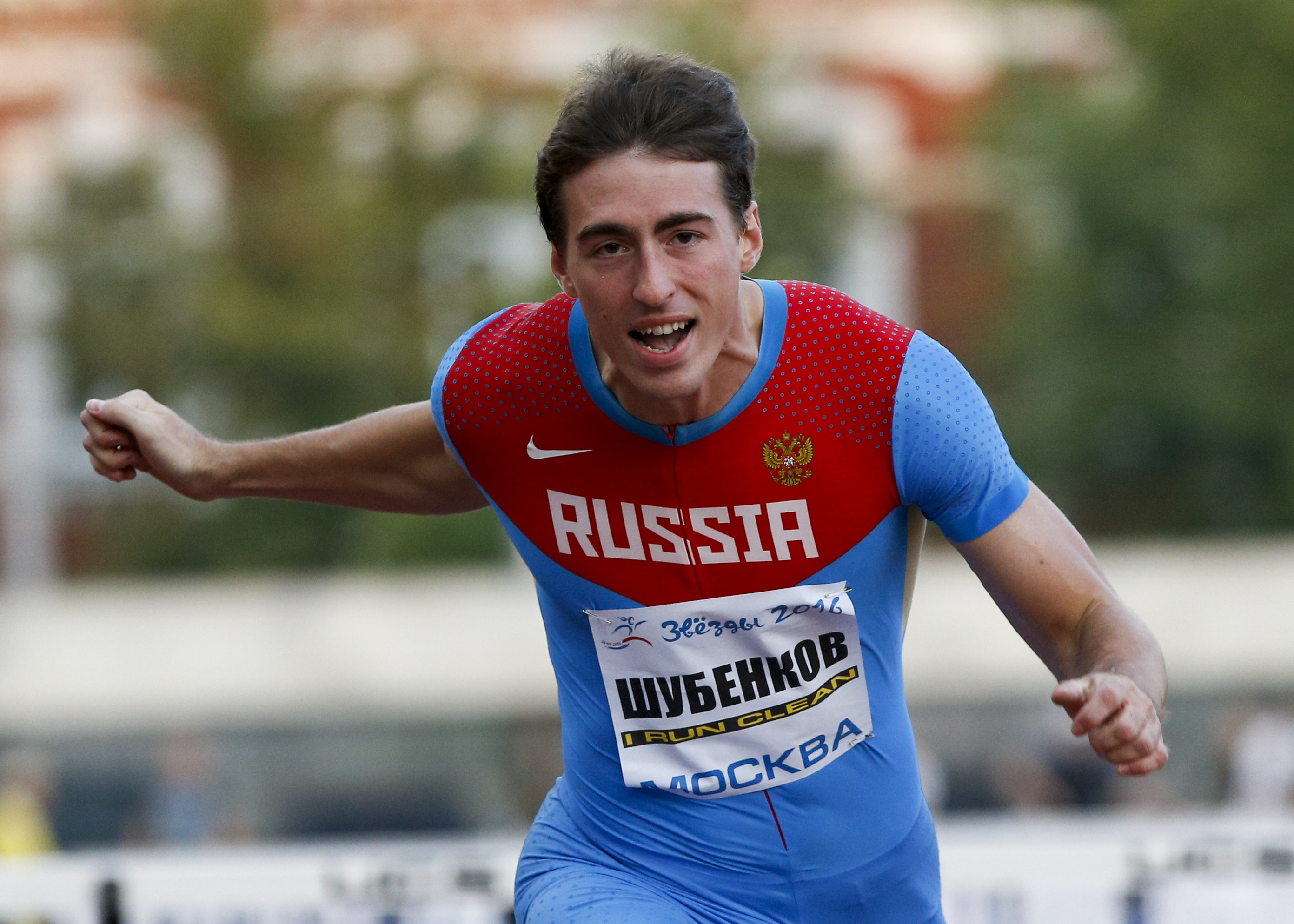
FILE – In this Thursday, July 28, 2016 file photo, world hurdles 110m champion Sergey Shubenkov competes during the Russian Stars 2016 track and field competitions in Moscow, Russia. Russia plans to send 19 athletes, including Sergei Shubenkov and Maria Lasitskene, to the track and field world championships in London in August 2017 despite its suspension from international competition over widespread doping. The 19, including three former world champions, have been given exemptions from Russia’s suspension after the International Association of Athletics Federations reviewed their history of drug testing. (AP Photo/Alexander Zemlianichenko, file)
ZHUKOVSKY, Russia — They won’t hear their anthem if they win. Their national colors — even on nail varnish — are strictly forbidden. Regardless, a group of Russian athletes is back at the track and field world championships.
W
Almost two years after a blanket suspension for widespread doping, and a year after just one Russian was allowed to compete on the Olympic track in Rio de Janeiro, 19 will compete at the world championships starting Friday.
In London, they’ll officially be “neutral athletes,” individuals not representing any country.
Sergei Shubenkov, who won the 110-meter hurdles at the 2015 world championships but had to sit out the Olympics last year because Russia was banned from international competition, said “I’ve got back almost all the rights I had.”
Decked out in an electric blue Russia tracksuit at his national championships last Friday, he lamented he still can’t “take this beautiful, awesome uniform to the worlds and flaunt it.”
Keen to head off any Russian celebrations, the International Association of Athletics Federations has issued its 19 neutrals with strict codes of conduct.
The Russian flag and national colors are banned, so uniforms in neutral colors must be approved by IAAF officials. Red, white and blue are forbidden, even on hairbands or bandages or accessories.
If the neutrals win, the IAAF’s anthem will play. Under the rules, an athlete who sings the Russian anthem faces a fine, though any legal tussles could prove embarrassing for the IAAF.
The rules “seem tough and a bit ridiculous,” said Shubenkov, who jokingly suggested there might be a loophole for fur hats. “Bringing a bear on a leash, would that count?”
The Russians will be in London when the IAAF holds a string of ceremonies re-awarding medals from past championships after doping cases.
Some originally belonged to Russians, including Tatyana Chernova, who beat Britain’s Jessica Ennis-Hill to heptathlon gold at the 2011 championships but was later stripped of that medal and others.
The Russians certainly looked like a team as they met Prime Minister Dmitry Medvedev last week at their national titles.
Their world championship preparation is subsidized by the Russian state, while entry papers were submitted by the still-suspended national track federation, whose head coach Yuri Borzakovsky expects between five and seven podium finishes.
Besides Shubenkov, another medal contender is reigning world high jump champion Maria Lasitskene, who won every round of the Diamond League this season. She just wants to block out the whole doping controversy. “I don’t want to waste my emotions on that. I need them for the competition,” she said.
More than two years of investigations and bans have made the team stronger, says pole vaulter Anzhelika Sidorova. “Everyone who’s there will support the others,” she said. “We’re all friends like never before.”
There’s a return for Russia’s only track and field Olympian of 2016, long jumper Darya Klishina, while some younger athletes could be medal threats too.
Sergei Shirobokov, an 18-year-old racewalker, has promise but would be a controversial champion given his links to a training center where more than 25 athletes have been banned for doping.
Still, it’s far from a full team.
Among the absentees are 2012 Olympic high jump champion Ivan Ukhov and former world indoor triple jump champion Lyukman Adams. Russian media reported both were refused neutral status by the IAAF.
Dozens more are serving bans, including former Olympic champions.
The IAAF is retesting samples from previous championships after World Anti-Doping Agency investigator Richard McLaren alleged a conspiracy of drug use and cover-ups stretching back years. An apparent cover-up of suspicious drug tests on the Russian track team before the 2014 world indoor championships is of particular interest.
While Russian President Vladimir Putin admitted in March the previous anti-doping system “did not work,” there’s been no rush to investigate what exactly went wrong, at least not publicly. Several officials resigned last year in unclear circumstances, but the then-Sports Minister Vitaly Mutko was promoted.
Russian law enforcement has sought to present McLaren’s key witness, former drug-test lab director Grigory Rodchenkov, as unreliable. The government continues to deny any role in doping cover-ups, frustrating the IAAF, which wants Russia to either accept or disprove McLaren’s findings.
Still, Russia is gradually getting closer to readmission to international track and field, which would make neutral uniforms a quirk of history. An IAAF taskforce on Monday said Russia was giving drug testers better access but hadn’t done enough to investigate past offenses.
“We’re coming out of those crises,” Sports Minister Pavel Kolobkov told reporters last week. Russian officials have toned down once-vehement criticism of the IAAF as they try to build bridges.
“It’ll be hard for the athletes to compete because they are all patriots of their country,” Kolobkov said when asked if he considered the absence of Russia’s flag insulting.
Whether the Russian athletes are neutral or not, he said, “everyone understands who they represent.”

